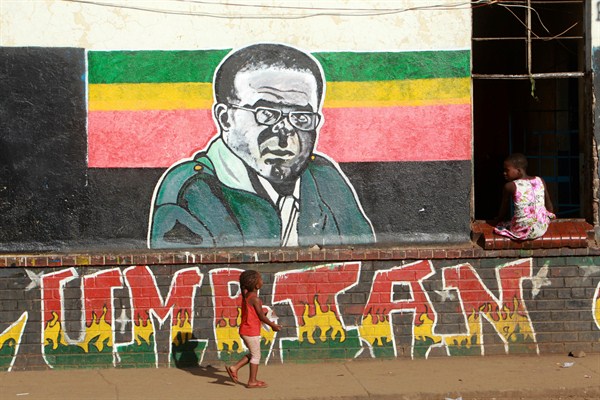2017 was a year of political transition in Africa, beginning with the flight into exile of Gambian dictator Yahya Jammeh and ending with a military intervention in Zimbabwe to remove Robert Mugabe from power, which he had held for 37 years. The continent still has numerous heads of state who seem inclined to stay in office for many years to come, if not for life. But several of them are facing new pressures that may make their continued rule untenable. WPR has compiled 10 articles that examine those pressures and look at which of Africa’s strongmen are most vulnerable.
Purchase this special report as a Kindle e-book.
Entering a New Era
To Ensure Its Democratic Transition, Gambia Will Need Justice—and Reconciliation
In January of last year, Gambia swore in an opposition presidential candidate for the first time in the country’s history. In order to consolidate the newfound democracy, Jeffrey Smith and David Rice argued last May, former President Yahya Jammeh must be held to account for atrocities committed during his more than two decades in power. Can the new government of President Adama Barrow bring justice toJammeh’s victims while also reuniting and rebuilding the country?
Angola’s historic handover of power last September came amid the country’s deepest economic crisis since before its civil war ended in 2002. New President Joao Lourenco will need to pursue tough economic reforms, Soren Kirk Jensen cautioned in October, in order to shed the burden of nearly 40 years of mismanagement by his predecessor, Jose Eduardo dos Santos.
As Zimbabwe begins life after Mugabe, neighboring South Africa could play a constructive role in laying out a democratic roadmap, as James Hamill wrote in November. Having endorsed the disastrous Mugabe-era status quo for far too long, the South African government should change course in its partnership with his successor, Emmerson Mnangagwa, to ensure the legitimacy of Zimbabwe’s transition.
Heading Toward the Edge
‘Kabila Must Go’: How Gridlock in Kinshasa Is Driving Violence in Eastern Congo
Philip Kleinfeld reported last month on how rising violence in eastern Democratic Republic of Congo was linked to President Joseph Kabila’s refusal to leave office after the expiration of his last term. As Kabila begins another year in power without a mandate, fear is mounting that Congo is sliding back into the chaos of the past—a development that U.N. peacekeepers may be powerless to stop.
For well over a year in the Republic of Congo, longtime leader Denis Sassou Nguesso’s regime waged a brutal armed conflict against rebels in the southeastern Pool region. WPR associate editor Robbie Corey-Boulet noted last month that while a recently announced cease-fire is welcome news for civilians, it also underscores the weakness of a government facing massive economic woes.
In December, following months of hostile debate, Uganda passed an unpopular constitutional amendment that could allow 73-year-old President Yoweri Museveni to remain in office for the rest of his life. Yet as lawmakers rally around Museveni, who was sworn in for the first time in 1986, the aggressive and ham-handed tactics of his ruling party are mobilizing a new generation of opposition leaders, Julian Hattem reported in October.
Chadian President Idriss Deby has endeared himself to the West by contributing to the fight against regional militant groups such as Boko Haram. This military cooperation has, in turn, led donor governments to overlook his ruthless domestic policies, meaning Deby has a free hand to crack down on government critics, Robbie Corey-Boulet wrote last May.
Critics of Gabonese President Ali Bongo—the son of Omar Bongo, who ruled the country for over 40 years—claim that an ongoing bid to revise the country’s constitution would establish a de facto monarchy in place of the country’s fragile democracy. The government says this is unfounded. The truth no doubt lies somewhere in between, as Robbie Corey-Boulet explained in December, but the stark polarization casts an ominous shadow over upcoming legislative elections.
Powers Behind the Scenes
The resistance by some leaders to democratic transfers of power across Africa is about more than retaining personal prestige, Rudy Massamba explained in October 2016. Politics, in many African countries, is the most lucrative business opportunity available. Heads of state often find themselves at the apex of a fortified network of entrenched interests that would unravel entirely if they were to relinquish office.
In March, James Hamill analyzed the crucial role that militaries continue to play in support of nominally civilian governments across the continent. While coups have been in decline across Africa since the 1990s, this trend has not correlated with a decline in overall military influence.

